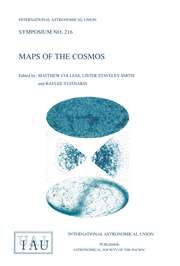No CrossRef data available.
Article contents
NGC 7027: New 7.8–20.0 μm Array Camera and Hα/Hβ CCD Image Analysis of Dust, PAH and Ionized Gas Distribution
Published online by Cambridge University Press: 07 August 2017
Extract
Infrared array camera images of the planetary nebula NGC7027 at seven wavelenghts between 7.8 and 20μm taken at the IRTF telescope are compared to Hα and Hβ images obtained at the CFHT, and published 2-, 6-, and 20-cm VLA maps, all made with better than ∼ 1 arcsec resolution. The mid-infrared images have also been deconvolved using the Maximum Residual Likelihood algorithm to show structural details on the ∼ 0.3 arcsec scale. The visible, infrared and radio images are aligned with ±0.2 arcsec astrometric precision using common features and visible stars. Image algebra can then be readily performed. The images are analysed to determine the spatial distribution of poly cyclic aromatic hydrocarbon (PAH) grains and ionized gas relative to the continuum dust emission. The results show the extent of the mid-infrared dust continuum, the PAH emission features at 8.65 and 11.25μm, and would reveal any contribution from 9.8 μm “silicate” emission. The optically thicker 20-cm emission more closely resembles the extinction-corrected Hα distribution. The large grains giving rise to the visible extinction (derived from the Hα/Hβ ratio) are distribued differently from the mid-infrared and ionized gaz, indicating the location of the outer cold dust. The 11.6μm image could contain both PAH and continuum grain emission, and we have attempted to separate the two components. It appears that the overall emission distributions are quite similar for all the infrared wavelengths, so the various dust constituents are generally uniformly mixed. However there are indications that the 11.6μm PAH emission distribution is patchy and not identical to the continuum dust, although not distinctly different in radial distance from the center. The ionized gas distribution peaks inside that of the dust continuum. The visible/infrared/radio spatial analysis, and color indices calculated from the infrared images, are used to develop a detailed new morphological model of NGC7027 based on this comprehensive multi-wavelength data set.
Information
- Type
- III. Highlights on the Nebulae
- Information
- Copyright
- Copyright © Kluwer 1993

